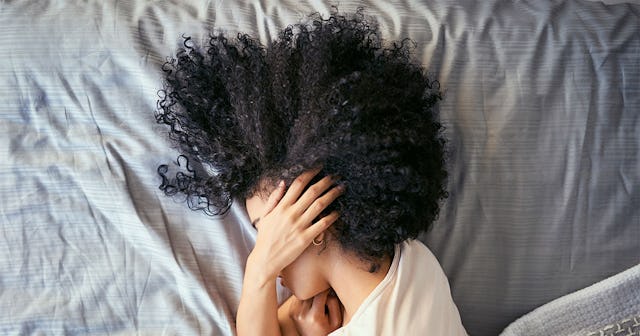'Stresslaxing' Is Real, And It’s Making My Anxiety Worse

You’ve probably never heard of “stresslaxing.” Hell, up until last week, I hadn’t either. The made-up term is vague and ambiguous. The word is (more or less) unknown. But when I saw a meme floating around the interwebs a few days ago with “stresslaxing” in it (and on it) I immediately felt seen and heard and understood. Why? Because “stresslaxing” is the act of being stressed out by relaxation. It is the notion that down time makes your anxiety worse.
Stresslaxing is “being so stressed that relaxing makes you more stressed because you’re not working on what’s making you stressed,” Urban Dictionary explains. It is a cycle, a conundrum. And while the term is new, the notion is not. In fact, studies have been conducted on this phenomena for some time.
A paper in the December 2018 issue of the Journal of Affective Disorders found that, for some people, relaxation makes their fears and insecurities worse. It actually leads to increased discomfort, anxiety, and worry. Of the 96 people studied, researchers found that people with generalized anxiety disorder were most sensitive to extreme emotional shifts, and that they tended to feel the most anxiety while practicing relaxation techniques. “People who are more vulnerable to relaxation-induced anxiety are often the ones with anxiety disorders,” Hanjoo Kim, a graduate student in psychology at Penn State University and co-author of the study, explained when the study was published — and that is the case with me.
I live with panic disorder and anxiety disorder (and have for some time), and while I know I need a solid self-care regimen — while I know I need to step back and take breaks — when I slow down, my brain speeds up. My mood cycles. Emotions are heightened. My thoughts race, and I panic. The stillness unsettles me. The silence makes me cross.
When I try to relax, I worry about what I could — or should — be doing. There are dishes to be washed. Clothes to be folded. Assignments and deadlines loom (quite literally) overhead.
When I try to relax, I become skittish and antsy. Often, I experience physical symptoms, like subconscious tremors and shakes.
When I try to relax, the voices in my head become louder. The ones which tell me I’m not good enough or smart enough. The ones which remind me of all the ways I’ve messed up, and of all the mistakes I’ve made, and forget meditation. I’ve tried to get into the practice numerous times and can’t. The sound of my breathing makes my chest feel heavier. I flounder. I struggle. My heart races. I gasp for air.
Of course, I’m not alone. Many individuals have “stresslaxed,” including Keri Rubenstein, a midwestern mother of two. “I get angry at the mere mention of meditation,” Rubenstein explains. “It’s not for me. Conventional meditation comes easier to neurotypical people and may not even be possible for neurodiverse individuals, like myself. My relaxed body doesn’t look like a typical person’s relaxed body. If my movement makes a typical person feel stressed, that doesn’t mean I’m stressed.”
Glynis Radcliffe echoed a similar sentiment. “Meditation makes me want to crawl out of my skin. I feel like ants are crawling all over me.” And Kendra Jane explained she struggles with stillness.
“My partner says it is unnerving to watch me literally pace in circles because I can’t sit down,” Jane tells Scary Mommy.
Ironically, “stresslaxing” appears to affect women — or those who identify as women — more often than men. During an informal Facebook survey, I found most female respondents felt guilty taking time for themselves.
“I don’t have anxiety,” Kylene Shea-De Leon tells Scary Mommy. “But when I sit down to relax I feel bad, like I should be doing something. Whether it’s doing a load of laundry or cleaning or organizing or food shopping… because, as a woman, I was taught I should always be ‘going’ or ‘doing.’ It’s worse now that I’m a parent, I always feel like there’s something to do, even if there’s not.” And Jane agrees.
“Relaxing makes me feel super guilty, the guilt then makes me feel more anxious — since I don’t get anything done — and the more anxious I get, the worse my OCD and then the more guilty I get,” Jane explains. “It is an awful spiral that often leaves me dissociated… and exhausted.”
The good news is, there are alternative (and more active) ways to relax. Walking, for example, can be calming and purposeful, i.e. you can walk to the bank, the park, or the grocery store. Cooking is, for some, an excellent stress relief activity, especially baking — which is active and involves both texture and movement. And crafting can be a great release too, particularly when the craft being made is a gift for someone. This assigns meaning to the moment. It alleviates the guilt that often accompanies “stresslaxing.” But whatever you do, choose it because it’s right for you and not because society suggests it is an activity you should enjoy. Because “stresslaxing” isn’t relaxing, and it’s time we (re)claim our solace and sanity. It’s time we all find a way to calm our hearts and soothe our minds.
This article was originally published on